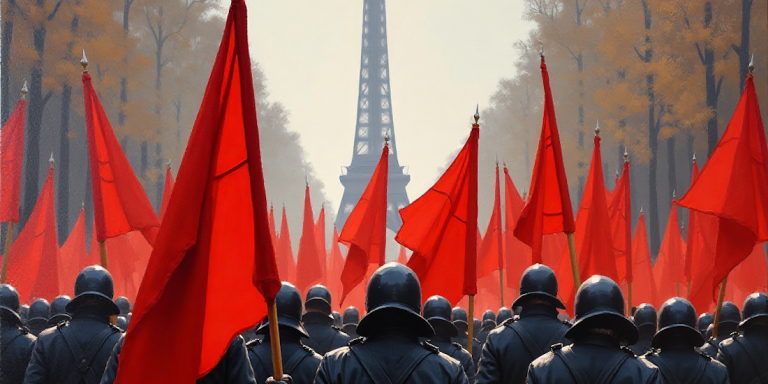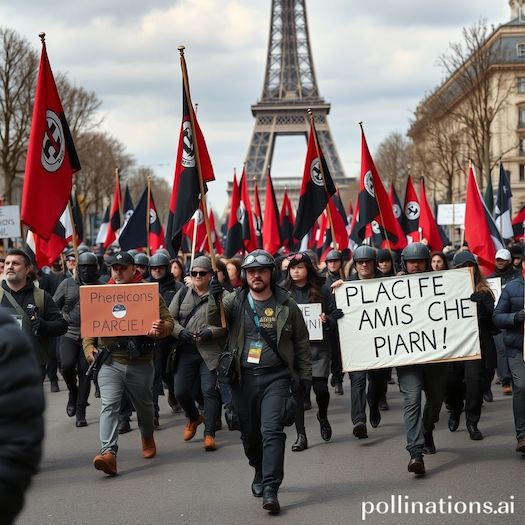
Demonstrations in Paris draw international concern as protesters advocate extreme nationalist views while officials struggle with free speech boundaries
Paris – A neo-fascist march that took place in central Paris this week has ignited fierce debate across Europe about the limits of free expression and the resurgence of far-right ideologies in Western democracies.
The demonstration, which drew approximately 2,500 participants according to Paris police estimates, featured participants displaying symbols and chanting slogans associated with fascist movements of the 1930s and 1940s.
Rising Concern Among European Leaders

French President Michel Barnier condemned the march, stating that “such displays of hate have no place in our Republic.”
The demonstration occurred on the anniversary of a significant historical event for far-right groups, raising questions about the timing and intent behind the gathering.
“How can such things be allowed?” asked prominent human rights advocate Marie Leclerc, who witnessed the march from her apartment overlooking the route.
“France fought against fascism. My grandparents risked everything to resist such ideologies, and now we see them paraded openly in our streets.”
The march proceeded despite efforts by several civic organizations to have it banned, citing laws against hate speech and incitement.
Paris police officials defended their decision to allow the demonstration, noting that prohibiting political expression without clear evidence of imminent lawbreaking would create dangerous precedents.
Legal Complexities and Democratic Values
Legal experts point to the challenging balance democracies face when confronting extremist viewpoints. “The paradox of tolerance requires democratic societies to carefully consider when intolerance itself must not be tolerated,” explained Dr. Jean Rousseau, professor of constitutional law at the Sorbonne University.
“While most European countries have restrictions on Nazi symbols and Holocaust denial, the boundaries become less clear with neo-fascist movements that deliberately avoid explicitly banned imagery while conveying similar ideologies,” Rousseau added.
French Interior Minister Antoine Dupont told reporters that authorities closely monitored the event for any legal violations. “Seventeen individuals were detained for specific actions that crossed into illegality, but the mere expression of controversial political views, however repugnant, is protected under our laws,” he stated.
Historical Context and Modern Implications
The resurgence of far-right movements across Europe has historical scholars drawing parallels to the 1930s, though most emphasize important differences in context. “Today’s democratic institutions are more robust, and these groups remain on the fringe,” noted Dr. Hannah Klein of the European Institute for Democracy Studies.
“However, the normalization of such public displays risks gradually shifting what’s considered acceptable discourse,” Klein cautioned. “The danger lies not in an immediate threat to democracy but in the slow erosion of norms that protect minority rights and human dignity.”
Counter-protesters outnumbered march participants by roughly three to one, according to observer estimates, with many Parisians spontaneously joining to voice opposition to the demonstration. Several carried signs reading “Never Again” in multiple languages.
Social Media Amplification Concerns
Digital rights monitors tracked how the march gained significant attention through coordinated social media campaigns. “What might have been a small, isolated event a decade ago can now reach millions through algorithmic amplification,” explained tech analyst Pierre Moreau of Digital Democracy Watch.
The event was livestreamed by participants and quickly spread across multiple platforms, with supportive comments pouring in from similar groups across Europe and North America. Several platforms later removed videos that violated their hate speech policies, though clips continue to circulate through less-moderated channels.
“Technology has created new challenges for containing extremist
ideologies,” said Moreau. “A march in Paris becomes global content
within minutes, potentially inspiring similar actions elsewhere.”
European Union officials have announced plans to review regulations concerning public demonstrations that promote anti-democratic ideologies, though meaningful action would require coordination across member states with differing legal traditions regarding free expression.
As Europe grapples with these complex issues, civil society groups are organizing educational initiatives aimed at younger generations, emphasizing historical lessons about the dangers of fascism and authoritarian movements. “Democracy requires constant vigilance,” said education activist Sophie Bernard. “That vigilance begins with understanding our history and recognizing dangerous patterns before they gain momentum.”
Neo-Fascist March Sparks Outrage Across European Capitals (May 11, 2025)
#SocialMedia #DigitalDemocracy
TAGS: Paris protest, neo-fascism, democratic values, European politics, free speech debate
Social Media
X: Neo-Fascist March Sparks Outrage Across European Capitals. Officials balance free speech concerns with extremism risks. #DemocracyWatch #EuropeanPolitics https://bit.ly/parisprotest
Bluesky: Neo-Fascist March Sparks Outrage Across European Capitals. French officials defend allowing protest while monitoring for illegal actions. Counter-protesters outnumbered participants 3-to-1. #DemocraticValues #FreeSpeechDebate https://bit.ly/parisprotest
LinkedIn: Neo-Fascist March Sparks Outrage Across European Capitals
This concerning development highlights critical challenges for business leaders and policy professionals navigating the balance between free expression and social responsibility. Organizations increasingly face pressure to articulate clear positions on democratic values while maintaining operational neutrality in polarized environments. The event demonstrates how political extremism impacts institutional trust – a vital consideration for all professional sectors operating in European markets. #CorporateCitizenship #EuropeanPolitics #DemocraticValues https://www.stewardshipreport.org/neo-fascist-march-paris
Truth Social: Neo-Fascist March Sparks Outrage Across European Capitals. French officials monitored the event while counter-protesters demonstrated democratic resilience. How should societies respond to extremist demonstrations? #FreeSpeech #DemocracyWatch https://bit.ly/parisprotest
Mastodon: Neo-Fascist March Sparks Outrage Across European Capitals. The demonstration raises crucial questions about how democracies should handle expressions of extremist ideologies. Counter-protesters outnumbered participants, showing community resistance to such movements. What responsibilities do platforms have regarding content from such events? #DemocraticValues #MediaEthics https://bit.ly/parisprotest
Instagram: Neo-Fascist March Sparks Outrage Across European Capitals. Learn how citizens and officials are responding to this concerning display and what it means for democratic values across Europe. Swipe up for the full story in bio.
#ParisMarch #DemocracyNow #EuropeanPolitics #HumanRights #CivilSociety
Facebook: Neo-Fascist March Sparks Outrage Across European Capitals
The troubling demonstration in Paris this week has ignited debate about free speech boundaries and the resurgence of extremist ideologies. Most encouraging was the response – counter-protesters outnumbered participants 3-to-1, showing strong civic resistance to such movements. Learn how different democratic institutions are responding to this challenge. #DemocraticValues #CivicEngagement https://www.stewardshipreport.org/neo-fascist-march-paris
Reddit: Neo-Fascist March Sparks Outrage Across European Capitals
A neo-fascist demonstration in Paris has raised difficult questions about democratic principles. Officials allowed the march citing free speech concerns, while counter-protesters outnumbered participants by 3-to-1. What’s your take – should democracies permit demonstrations promoting anti-democratic ideologies? Where exactly should the line be drawn? #PoliticalDiscussion #DemocracyDebate https://www.stewardshipreport.org/neo-fascist-march-paris